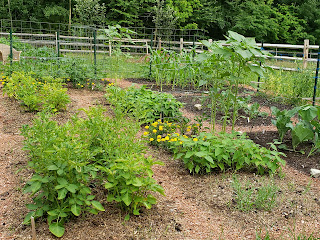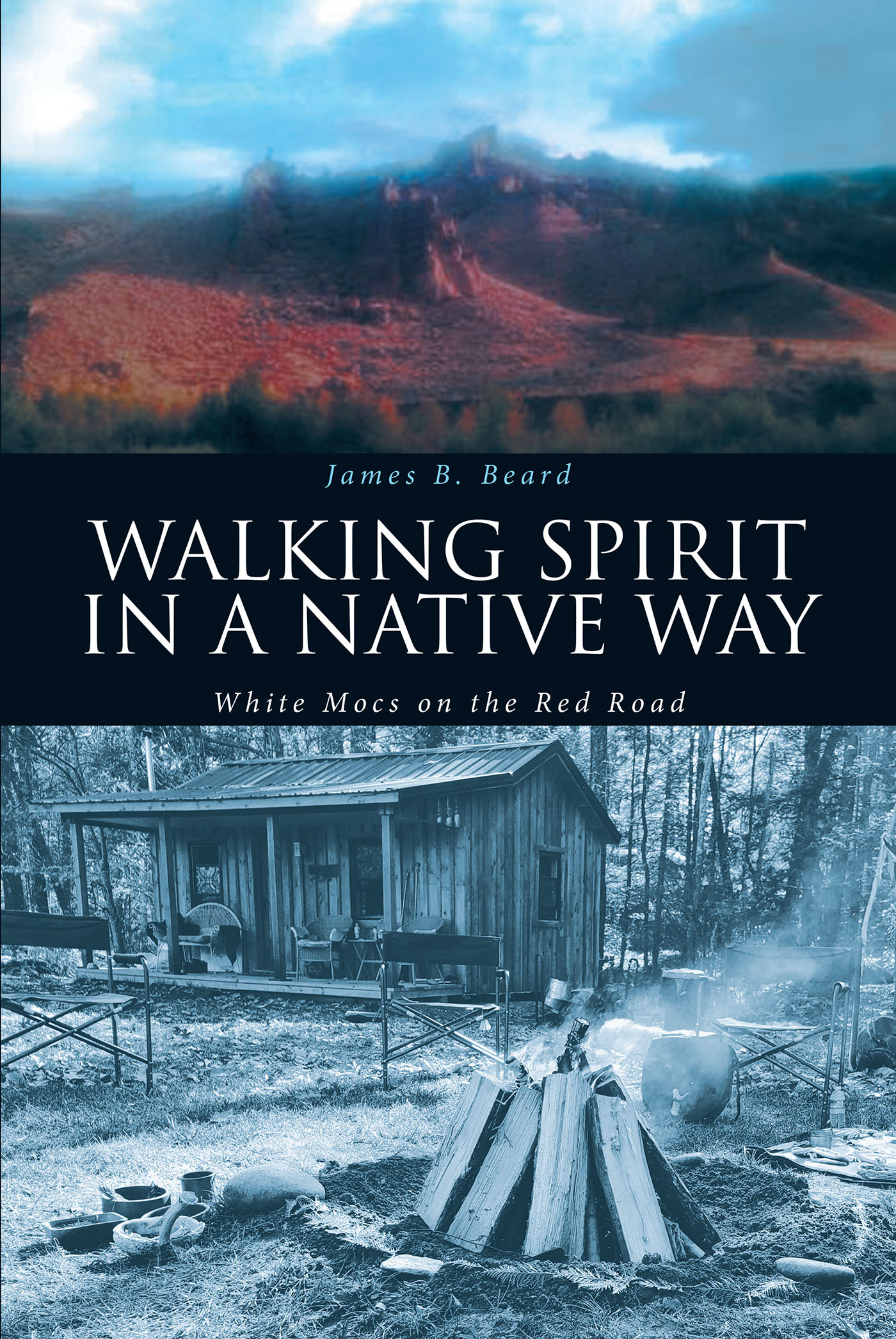An Old Old gardening method - guided by Nature and Spirit
Gardening with Respect - A Seven Grandfathers Teaching
Garden / Gitigan
The Seven Gifts:: Wisdom , Respect , Honesty , Humility , Love , Courage , Truth
When I was young, I remember my mother always keeping a garden. She would plant lettuce, carrots, beans, peas, corn, potato, tomato, beets, and all sorts of vegetables in the garden. My Dad would go out in the early Spring and turn the soil down to about fifteen inches so that the ground was broken up and would drain well. This was the way to prepare a garden. Mom and Dad would spend weekends in late May putting in the seeds.
As the garden plants began to grow so did the weeds. We would all go out to weed out the garden throughout the summer. It was a never-ending job. I think we produced more weeds than vegetables. We did have wonderful vegetables to eat and enjoy.
My parents lived from 1903 into the 1970’s. Gardening was a normal part of living for them. When they were young their parents would grow vegetables for year-round food supply mixed in with locally purchased produce from local farmers. You ate what you could produce in season or preserve for other times of the year. During WWI and WWII, the garden was enlarged as a victory garden to raise more food to help support troops overseas.
When I grew up it was normal to see gardening in this manner. When the family would take rides in the country, we would see farmers out tilling their fields. To prepare the fields they would plow deep furrows to break up the ground for planting. It was the same technique that we used in our garden but on a grander scale.
With all good intentions of providing food and caring for the land, who would have thought that our farming methods were so destructive?
I thought Woodland Native American people did not farm.
In my forties a man entered my life who was an Elder of an American Indian tribe in Minnesota. His name was Brian and he introduced me to a new understanding of the land and how to view and care for it. He was not showing me gardening techniques or anything about gardening from his point of view. Brian was demonstrating, by how he lived, the old ways of his people.
He would take me for walks in the woods to look for medicine plants. When we would find a plant Brian was looking for he would gently harvest it by digging into the ground with his fingers to gently remove the plant, root and all. Before removing the plant, he would offer a prayer asking permission to take the plant. He would only take what he needed and make sure that enough was left to continue the plant propagation in the area.
Over time Brian taught me many things. If man is taking from the Earth, then man must give back in return. When planting, the earth should not be disturbed. Plantings need to have composites from the woods to cover seed and they will grow. Never pierce the land and when you must then you should make an offering to ask forgiveness for your action.
Brian knew of places in the woods around his reservation where fields of strawberries grew, blue berry fields would abound. Places in the woods that seemed like gardens if you knew where to look. Many of the plants growing near old Indigenous settlements did not seem to be in the place one might expect. As if those plants had intentionally been put in those places. The fact of the matter is people had planted certain plants close to their settlements over eons of time.
Over the years I have planted many gardens
The method I would use to make a garden was the same as my parents. In Spring I would turn the soil as deeply as I could and make a beautiful plot of dirt. I would amend the soil with fertilizers and in May I would plant. Some years everything would come up, including the weeds. Other years a few plants would come up and always the weeds. For me it was guesswork and blindly following what I thought was the way to garden. Over time the effort to make a spring garden became more a chore instead of a pleasant experience to reap the rewards of bounty from my garden.
Last year I completed my small garden plot by June 1st. My partner, Monica, and I were sitting by the garden and she was admiring the neat furrows and plantings of the tomato plants. Then she looked into our pasture and said that we should put a larger garden in the pasture. I gave her my usual answer. Okay! I often said yes to her suggestions knowing full well that we would never get around to it. Later in July I was informed by Monica that she had ordered a new fence to separate the new garden area from the rest of the pasture. I looked at the small garden we already had, now full of weed with a plant or two here and there realizing she was intent on having more garden. This was not a task that I really wanted to take on. The field was made up of sand and clay and mostly produced more weeds than grass. The ground would have plenty of rocks and be difficult to till into a garden.
Later Monica referred me to a YouTube channel by Charles Dowding on “No-Dig” gardening. The whole concept seemed foreign to me. Charles suggested that instead of digging one should build the garden on compost laid on cardboard over the ground. He pointed out that by not disturbing the ground the microbes and carbon would remain in the ground. The cardboard would darken and suffocate the weed growth underneath and keep moisture in the ground. The dead root channels of the weeds would allow new growth coming down through the cardboard to easily root into the original soil below. The compost has few weed seeds and can be easily maintained keeping weeds out. He went on to point out that this is a natural way that nature grows things. In the forest life goes through cycles and sheds old life back to the earth covering the ground and rotting into a compost filled with microbes to aid in breaking down the vegetation while storing carbon. New seedlings fall into the rotting compost and grow new life.
This different way of gardening obviously has many benefits if it works. Imagine reducing the weeding time in your garden by 90%. Imagine watering less because of better water retention in the soil. Imagine not having to use commercial fertilizers. Imagine less pests in the garden because of cleaner beds. Imagine having more time to gently tend to your plants because of time saved from weeding. These are a few of the benefits but not all by any stretch of the imagination.
I had a compost problem.
Most people would think the problem would be finding enough compost to fill a garden. It is not hard to find compost and it is not that expensive. Before looking at Charles Dowding’s program I had so much manure and hay that I could not get rid of it. Every year I would have to pay someone to take it away. We have a horse, two goats, some runner ducks and chickens. Finding a way to use the manure was quickly solved when my son, Nick, suggested we use the compost for the new gardens. Now I maintain seven graduating piles from fresh to aged compost. Every week I turn one pile in the series until I reach the aged stage. That equates to about six yards of compost in the making. Now my yard cuttings and animal clean-up have become a valuable material and what I have on my land goes back to the land.
Now I have to make a new garden.
I began this project in August of last year by clearing a harvested part of my garden and prepping it as a “no-till/no dig” garden. It was an easy task. I simply laid down some cardboard, watered it and put two wheel barrels of compost on top to make a 4ft x 8ft area bed about 3inchs thick on the cardboard. It seemed odd to me to be planting at the end of August in New England, but I went ahead and direct seed planted some lettuce and carrots. Within a week the plants were appearing. Into fall we were eating lettuce. Not a long enough season for the carrots but at least I now knew that things would grow in straight compost.
In spring I put down enough cardboard to cover a thirty by 30ft x 40ft area in the field. With the compost I made twelve 4ft x 8ft beds over the cardboard and separated them with cedar mulch to make paths. In one day, I had completely put down a large garden.
The first thing I planted were potatoes 🥔. Then other vegetables such as peas, brassicas, tomatoes and corn 🌽.
But, what about The Seven Gifts: Wisdom, Respect, Honesty, Humility, Love, Courage, Truth? What does that have to do with a garden?
Everything about the concept of a no till/no dig garden relates to a natural way to produce foods. When I traveled with Brian and his father, they would share their knowledge through stories. The stories were passed down from Elders to the people from generation to generation. Each story contains several teachings to help people live their lives and live in peace together. One of the stories they shared was called The Seven Grandfather Teachings. Over time I have attempted to incorporate the values in this story to myself and others around me.
In making a no-till / no-did garden I began to see that the values stated in the story apply to more than each person. They are applicable to all life.
Creating of compost to harvesting the plants and returning the plants for more compost is a natural process. Each part of the process incorporates the seven gifts. If any one of the gifts are left out the process will fail.
Compost: Knowing how to make it properly (truth). Allowing time (courage). Turning it properly (love). Keeping a proper mix of water and air (respect). Recognizing it is equal to all other parts of the growing process (humility). Allowing the compost to fully process (honesty). Understanding that it is a natural process (wisdom). The same values can be applied to putting down the garden bed, planting and caring for the vegetables and flowers in balance with all things.














Comments
Post a Comment